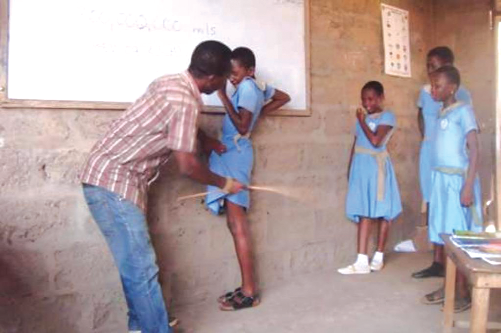Growing indiscipline in schools has been the subject of worry for most school authorities and the debate on the need to adopt a more effective and sustainable way of addressing the challenge is as old as the matter itself.
Some school authorities have had the unpleasant duty of suspending or even dismissing some students completely for indiscipline.
A school is a place where skills are taught and character moulded; it is a place where seeds of self-discipline are sown and nurtured among learners for the greater good of society, but it is also a place where some very bad habits are formed for present and later use.
Many otherwise cool and responsible students tend to pick up some bad habits from school, thus becoming morally corrupt, aggressive and irresponsible.
At school, teachers are tasked with a great responsibility of ensuring learners develop acceptable behaviour and moral dignity.
To this end teachers adopt various measures to train learners and to keep deviance in check.
Corporal punishment
The commonest and most popular approach to dealing with student indiscipline is corporal punishment. Corporal punishment mainly involves subjecting someone to pain.
It can be classified under two main categories; namely physical punishment and emotional punishment.
Physical Punishment includes—slapping, smacking, punching or hitting with objects. It also involves pulling a child’s ears or hair, forcing him to hold an uncomfortable position or compelling him to stand in the heat or cold.
Emotional punishment comes in the form of shouting, yelling, name-calling, ignoring, embarrassing, shaming, etc.
Corporal punishment achieves instant results, yet has far-reaching consequences. A child misbehaves. He gets spanked or smacked or ridiculed. He feels pain. Teacher or parent feels relieved, but beyond these immediate reactions are implications for the future.
Dorothy Law Nolte (American Writer and Family Counsellor) sums up these implications in her famous piece “Children Learn What They Live.”If a child lives with criticism, he learns to condemn.
If a child lives with hostility, he learns to fight.
If a child lives with fear, he learns to be apprehensive.
If a child lives with pity, he learns to feel sorry for himself.
If a child lives with ridicule, he learns to be shy.
If a child lives with jealousy, he learns to feel envy.
If a child lives with shame, he learns to feel guilty.
But
If a child lives with tolerance, he learns to be patient.
If a child lives with encouragement, he learns to be confident.
If a child lives with praise, he learns to be appreciative.
If a child lives with acceptance, he learns to love.
If children live with approval, they learn to like themselves.
If a child lives with honesty, he learns what truth is.
If a child lives with fairness, he learns justice.
If children live with recognition, they learn to have a goal.
If children live with sharing, they learn to be generous.
If a child lives with security, he learns to have faith in himself and those about him.
If a child lives with friendliness, he learns the world is a nice place in which to live.
Positive Discipline
Adopting the right approach to discipline in schools would prevent the escalation of indiscipline and its attendant consequences, including dismissals—which in most cases tend to end the
academic journey of some students.
Teachers and parents must make frantic efforts to find an alternative to corporal punishment in schools. Positive Discipline (PD) is a humane alternative to corporal punishment at home and in schools.
It is a holistic approach to education premised on the idea that children in themselves are not bad, rather they exhibit good or bad behaviour. It recognises that all aspects of children’s learning and development are interrelated and focuses on long-term solutions that develop learners’ own self-discipline. PD engenders positive approval from learners.
Good behaviour can be taught and reinforced while weaning the bad behaviour without hurting the child emotionally or physically. PD enhances long-term solutions that develop learners’ own self-discipline.
It also teaches children how to handle situations more appropriately while remaining calm, friendly and respectful and promotes positive decision making.
End Word
Teachers and parents who remain fixated on the use of corporal punishment should not be condemned entirely as research would prove that they themselves have been victims of corporal punishment at one time or the other in their lives.
Organising workshops on Positive Discipline for teachers especially would serve to help them appreciate the concept as a better alternative to corporal punishment in schools.
The school environment can, and should, be a lovely place to be.
Writer’s email: bsenamm8@yahoo.co.uk

